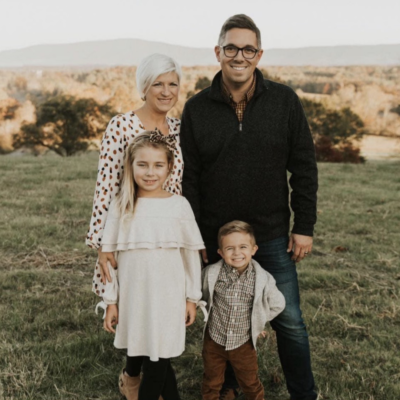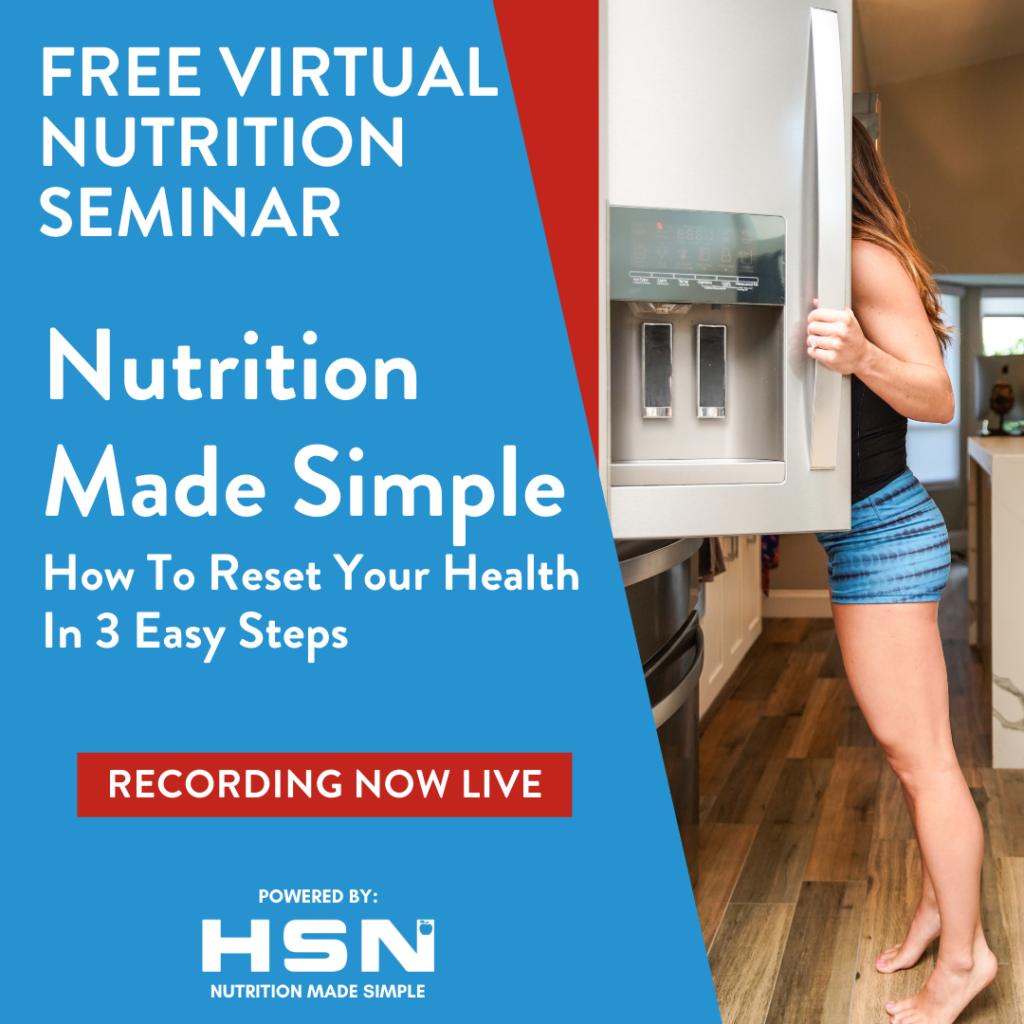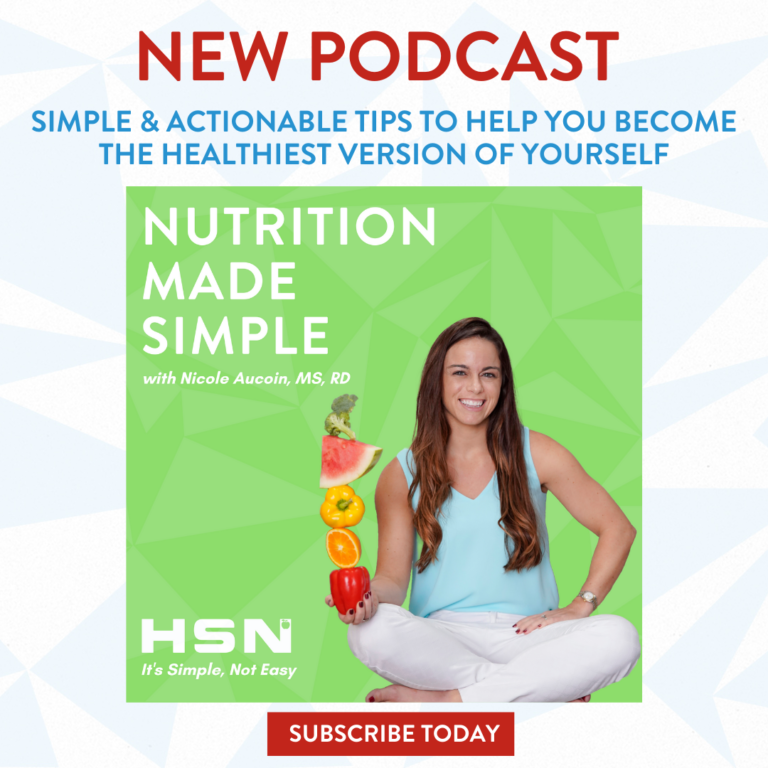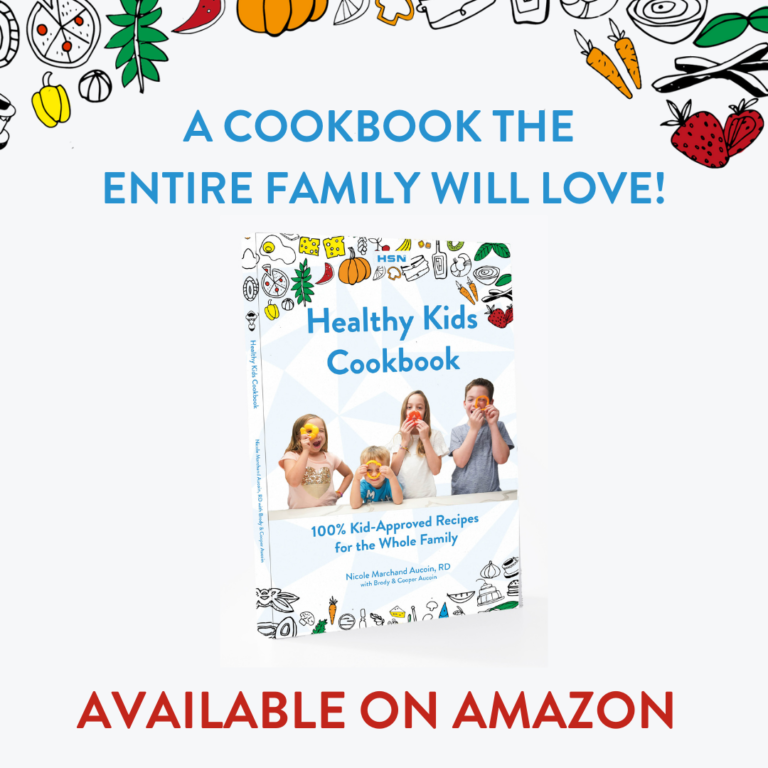In today’s podcast, Ashley Osterman & Nicole Aucoin discuss four tips for helping families to dial in their nutrition.
Here’s what we know; no parent wants to fight with their kids about food. No parent enjoys being a short-order cook, so today we have some free help based on 25 years of combined experience working with kids and nutrition.
Don’t forget to subscribe to this podcast for FREE help!
4 Nutrition Tips for a Healthy Family
Get The Entire Family On Board
It is so much easier for you to be successful long-term when your support system, when the people around you are on the same page.
You can never be too young or too old to start learning healthy habits and learning how to really dial in your nutrition for optimal health and wellness.
Make It Fun
Make Friday a try day!
A lot of times kids and adults alike can be picky eaters, right? There might be some foods or food groups that we don’t like to eat, so how do we get adults and kids excited in trying new foods? Well, making one day a week the day where we try something, and of course getting them involved.
Let the kids pick out what they want to try. Ask them to explain how it tastes or smells or looks. Have them try it raw and then maybe cooked a different way, like air frying or grilling or baking. Then explain if they liked it or not and if they would try it again.
Start Small
It seems so simple, just focus on one thing at a time.
Instead of trying to change everything at one time and feeling overwhelmed if you are the person cooking everything. You’re going to have your spouse, significant other and your kids overwhelmed as well. All of the things that were once familiar to them are now gone, start small. Start with one thing at a time and then slowly build from there.
Fostering A Healthy Relationship With Food
This is so important working with kids and families and really anyone, is that we really need to be fostering a healthy relationship with food.
Let’s talk about adding more healthy things in, let’s fill our stomach with those healthy things first. One of the easy strategies to do is eat your veggies first.
Eat your veggies first and then go to your protein, save your starch for the end.
MEET THE CAMPBELL FAMILY
They are probably just like you and your family — busy juggling work, kids and all of life’s activities.
They wanted help creating a plan to get healthy in the new year so they signed up for Family Nutrition Coaching with Healthy Steps Nutrition.
To inspire other families to make health a way of life, we are documenting their entire journey — starting with an initial meeting.
If you are curious about how a nutrition coach could help you and your family, watch this video.
In This Video, Nicole & Jason, The Owners of Healthy Steps Nutrition, Meet The Campbell Family To Start Their Nutrition Journey.
See How It Works & How They Create A Plan Together By Watching This Video.
ARE YOU LOOKING FOR A GUIDE TO HELP YOU & YOUR FAMILY?
Join The Nutrition Made Simple
6-Week Nutrition Challenge
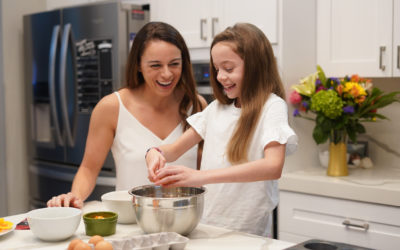
Individual & Family Options Available
- Monday, February 1st to Friday, March 12th
- Three Individual Meetings With Your Nutrition Coach (Virtual or In-Person)
- Exclusive Access To The HSN App (Weekly Videos, Recipes, & Meal Ideas)
- Weekly Prizes
- Community To Support You Every Step Of The Way
INDIVIDUAL NUTRITION CHALLENGE
Investment: $259
ONLY ACCEPTING 30 INDIVIDUALS
ADDITIONAL PODCAST EPISODES TO LISTEN TO
Episode Transcript:
Nicole Aucoin (00:04):
Welcome back to the Nutrition Made Simple Podcast. At Healthy Steps Nutrition, we believe something as fundamental as nutrition shouldn’t be complicated, which is why we focus on a simple habit-based approach when working with clients. I’m your host, Nicole Aucoin, registered dietitian and founder of Healthy Steps Nutrition, CrossFit HSN, and HSN Mentoring. I’m also the author of the Healthy Kids Cookbook: 100% ‘Kid-Approved’ Recipes For The Whole Family. If you haven’t seen this or gotten it yet, I highly recommend that you do.
Nicole Aucoin (00:39):
In this podcast, we’ll be teaching you how to take one step at a time to become the healthiest version of yourself. Today, we are talking about four tips for helping families dial in their nutrition. Here’s what I know. No parent wants to fight with their kids about food, no parent enjoys being a short order cook, and we have some free help for you today. We will get to this episode on four tips for helping families dial in their nutrition right after this message.
Nicole Aucoin (01:14):
Our mission is to empower 4,000 people to ditch the all or nothing mindset and take one step to become a healthier version of themselves in January. Do you know someone who’s looking to lose weight or a family that’s looking to eat healthier this new year? We would love for you to share this podcast with them, you never know who could use some words of encouragement. Take a screenshot, post it on social and tag @HealthyStepsNutrition so your friends can find this awesome free help. Also, don’t forget to subscribe so you catch every episode. Enjoy.
Nicole Aucoin (02:00):
Ashley Osterman, welcome back to the Nutrition Made Simple Podcast.
Ashley Osterman (02:05):
Thanks, Nicole. Always so fun to be on and chat with you about some easy, simple strategies to make health and wellness a priority in our listeners’ lives.
Nicole Aucoin (02:14):
Today, we are talking about four tips for healthy family nutrition.
Ashley Osterman (02:21):
I love working with families. I think it is so amazing when families decide to take control of their health and do it together.
Nicole Aucoin (02:31):
It is so much easier for you to be successful long-term when your support system, when the people around you are on the same page. So, let’s just dive into it. So, tip number one when we’re talking about family nutrition is we have to get the entire family on board.
Ashley Osterman (02:48):
The whole family, right? You can never be too young or too old to start learning healthy habits and learning how to really dial in your nutrition for optimal health and wellness.
Nicole Aucoin (03:00):
Here’s why. No one wants to be told what to do, right?
Ashley Osterman (03:04):
Of course not.
Nicole Aucoin (03:05):
So, if you get the buy-in from everyone to why this is important and how it’s going to help you all be healthy long-term, you’re going to have some autonomy, right? If people can make decisions, they’re going to be more bought in to what they’re trying to do and you guys will be able to support each other.
Ashley Osterman (03:21):
I think that starts off with having a family conversation about the why. What’s the why behind wanting to embark on this journey?
Nicole Aucoin (03:30):
I went in and we recently went up to Tennessee to help the Campbell family with their nutrition journey, and that was really how we started off the day. I said, “What does success look like to you guys and why did you want to start this in the first place?” Kristen, the mom and wife said, “Nicole, we eat two meals at home a month, the rest is at my parents’ house or Clark’s parent’s house, and we don’t really eat as a family that much. Or we’re on the go, we’re eating out, I want to be able to eat more home cooked family meals.”
Nicole Aucoin (04:03):
Then Clark, which my favorite answer, Kristen’s answer was great too, but Clark said, “I do not want my kids at age 30 to just be learning about nutrition, I want them to grow up understanding what healthy food is and why it’s important.” That at the end of the day I think is the culmination of family nutrition, right? Let’s get you spending more time as a family together in the house, control what you’re putting in your body, but then helping your kids understand how healthy eating is going to help them either perform better in sports or do better in school, concentrate. All of the things that are so important to them.
Ashley Osterman (04:40):
Absolutely. That why, having that conversation, really talking it out as a family is such a great way to start, because then we all understand the why behind it and we’re all there to keep each other accountable. I think the next thing to getting everyone on board is you really have to get the buy-in from everyone by giving them autonomy. Everyone needs to be involved.
Nicole Aucoin (05:03):
One of the things that we did with the Campbell family is we had the cookbook opened and we, they looked at recipes and said what recipes look good to you? It was a family decision, it wasn’t Kristen and Clark picking out the recipes for the family. Honestly, the kids picked them out and Kristen and Clark were like, “Yeah, that sounds good, that sounds good.”
Nicole Aucoin (05:19):
But it was really cool, we got them involved with the whole process. The kids helped with seeing what was in the pantry, they helped grocery shopping, we really got everyone on board. The other piece of the puzzle is who are the family members that might not be in the immediate household that affect what you eat?
Ashley Osterman (05:36):
Yes.
Nicole Aucoin (05:36):
So for instance with the Campbell family, they eat a lot of meals at the grandparents’ house. So, it was a conversation that we called them up and said, “Hey, this is what we’re doing, this is why it’s important to us. We need your help. If you’re cooking these meals, we’re going to give you a cookbook and we would love for you to make some of these recipes from the cookbook so that you’re involved too. We don’t have to completely stop eating at your house, but it’s a consistent experience, whether we’re at home or we’re at our grandparent’s house.”
Ashley Osterman (06:06):
Absolutely. So anyone who has a role or a part in family nutrition, so that can be a family member that’s not immediate like a grandparent or uncle or aunt or a caregiver. If you have a babysitter or someone else who comes over or a teacher who is involved in the meal prep or the snacks, make sure everyone is involved and onboard.
Nicole Aucoin (06:25):
All right, let’s go to tip number two, make it fun.
Ashley Osterman (06:29):
Yes.
Nicole Aucoin (06:30):
One of the things, this idea actually came from you, Friday try day.
Ashley Osterman (06:34):
Yes, making Friday a try day. This is a really cool thing that I learned in pediatric nutrition several years ago. A lot of times kids and adults alike can be picky eaters, right? There might be some foods or food groups that we don’t like to eat, so how do we get adults and kids excited in trying new foods? Well, making one day a week the day where we try something, and of course getting them involved.
Ashley Osterman (07:00):
So letting the kids pick out what they want to try, asking them to explain how it tastes or smells or looks, having them try it raw and then maybe cooked a different way, like air frying or grilling or baking. Then explain if they liked it or not and if they would try it again.
Nicole Aucoin (07:20):
We made it a game with the Campbell’s, their youngest son is quite the picky eater. He does great trying new foods now, he actually tried three in one day, because he really wanted to play this Friday try day game for three weeks in a row. We knocked it out and now is going with it. But you have to make it fun for them and using non-food rewards for when they do participate.
Nicole Aucoin (07:39):
So we said, “Hey, you just got this Switch game, you’re super excited about it. You do Friday try day for 12 weeks in a row, and you’re going to get a new Switch game.” He was so excited about it, he was on board. But there’s got to be sometimes a third party, like a nutrition coach. The Campbell’s didn’t have the conversation with Reed about it, I did.
Ashley Osterman (07:59):
Right.
Nicole Aucoin (08:00):
Right? So it was a third party, it wasn’t a fight. He was excited about it. He was open to the idea, because it wasn’t their mom and dad telling him that he had to do something, right?
Ashley Osterman (08:09):
Right. Sometimes that is exactly what you need, they need to hear it from somebody else. They’re around mom and dad all day, they get into their routine, so hearing it from someone else, making it a game, gamifying the process with kids is so great to get that buy-in and that excitement.
Nicole Aucoin (08:25):
So, Friday try day’s really awesome. Remember when you’re trying new foods, it takes 12 to 15 times of trying something before you know if you really like it or not. Just because you don’t like steamed broccoli or raw broccoli, doesn’t mean you might not like it in the air fryer with a little bit of seasoning on it. No, you have to try things different ways and definitely trying things at the beginning of the meal is going to help you, instead of trying it at the end when you’re really full.
Nicole Aucoin (08:49):
All right, let’s talk about tip number three. I think this one is a culture shift for so many people.
Ashley Osterman (08:55):
Yeah, we live in this microwave society and many families have been accustomed to diet culture. Lose 30 pounds in 30 days, go on this crazy diet for six weeks, that we don’t understand how to take a step back and really they start small.
Nicole Aucoin (09:13):
You have to start small. Especially when we’re looking at getting kids on board, changing everything at one time can be so overwhelming and actually could be destructive for their relationship with food. So, what do we really mean? I’m thinking when we’re talking about starting small, just do one thing at a time.
Ashley Osterman (09:35):
Yeah, just one thing. It seems so simple, but just focusing on one thing at a time. So Nicole, I know for instance with the Campbell family, you guys went through the cookbook, the kids picked out seven or eight different recipes they wanted to try, but you only started with two dinner staples for the week.
Nicole Aucoin (09:54):
It really went back to the why of why we picked dinner. Could we have started at breakfast? Absolutely. They all need help with breakfast, but Kristen said her number one priority was eating more dinners at home. So, let’s start there. Let’s start getting some simple wins with some easy recipes. Clark and I actually cooked them. At our household, Jason, my husband, is the cook of the family, I usually am on the other side of the counter just talking out of his way, because he likes his kitchen space to be his kitchen space.
Nicole Aucoin (10:26):
But in this case, Kristen does usually most of the cooking, I don’t think Clark has ever cooked anything in his life. You guys should watch the video if you’re listening to this. We’ll link it in the show notes, how we started the Campbell family journey, but we got Clark in the kitchen and he made a simple recipe. He made egg roll in a bowl. Ashley, this recipe came from you, and it’s so easy.
Ashley Osterman (10:46):
I love that video, because you can see Clark, first he’s hesitant, he’s not sure, like, oh gosh, stove, cooking utensils. But as he gets more into it, the confidence grows and his smile grows and his enthusiasm grows, until that point where he sits down at the table and has his first bite of the food and he’s just taken back. Like, “Man, I cooked this.”
Nicole Aucoin (11:05):
Yeah, he’s like, “I can conquer the world right now.” But it starts with something small. So instead of trying to change everything at one time and feeling overwhelmed if you are the person cooking everything and having your spouse, significant other and your kids overwhelmed, because all of the things that were once familiar to them are now gone, start small. Start with one thing at a time and then slowly build from there.
Ashley Osterman (11:30):
Absolutely. All right, so I think our fourth tip is so important working with kids and families and really anyone, is that we really need to be fostering a healthy relationship with food. What I mean is looking at healthy lifestyles, not restrictive diets, not negative connotations towards foods being good or bad or weight or specific things like that, looking at being healthy with your lifestyle.
Nicole Aucoin (12:00):
I think when we’re talking about food and changing your lifestyle and fostering a positive relationship with food, to me, it starts with adding more things that are awesome in, instead of saying, “No, you can’t have this, take all these things away.” Because what happens then is you end up craving more of those foods, and then all of a sudden when you get it, you’re bingeing on something, then you feel really crappy after, right?
Ashley Osterman (12:24):
Absolutely.
Nicole Aucoin (12:25):
So, let’s talk about adding more healthy things in, let’s fill our stomach with those healthy things first. One of the easy strategies to do is eat your veggies first.
Ashley Osterman (12:34):
Yep.
Nicole Aucoin (12:35):
Eat your veggies first and then go to your protein, save your starch for the end. When our kids were little, I used to give them their vegetables on the plate and then after they ate all of that, they would get everything else on the plate and they could eat whatever they wanted after. But it was always let’s get those vegetables in first, let’s eat those, let’s fill our stomachs up with that and then have the protein and the starch.
Ashley Osterman (12:56):
Yeah, it’s amazing to see that when we start doing that and adding more of the healthy in, the unhealthy or the foods that we should consume less of or limit start to actually do that, we eat less of them. One of my favorite examples of working with families is having kids who really love juice and drink juice all day. So I’m not going to take the juice away from them, what I’m going to do is I’m going to encourage them to start drinking water with every meal and snack. Then by default, they’re drinking less juice and fostering that healthy relationship with food, not that restrictive diet mentality.
Ashley Osterman (13:29):
Another thing that we look at when fostering a healthy relationship with food, and Nicole, you mentioned this with tip number two Friday try day is looking at non-food rewards. A lot of cultures and some generations, older generations really do this a lot, is that they give food, treats, sweets as a reward. Instead of doing that, I challenge you to shift that mindset to looking at non-food rewards. Is there a game that the kids or the family can reach towards? Is there a special activity that you’ve been wanting to do that they can then do once they accomplish their goal? So, looking at non-food rewards.
Nicole Aucoin (14:10):
Well, that’s interesting, because usually the rewards that are related to food are usually loaded with sugar.
Ashley Osterman (14:15):
Oh, yeah.
Nicole Aucoin (14:16):
Then what happens is kids start associating the happiness of reaching that reward with the sugar, and then they start associating sugar with happy feelings. Which is already chemically in our brains, we associate sugar with dopamine releases and it makes us happy, right? So, it’s like this whole thing around food rewards that’s just not fostering a healthy relationship with food at all.
Ashley Osterman (14:42):
Absolutely, it’s so true. One other thing that we love to do with families and kids when fostering a healthy relationship with food is really taking on some nutrition education. Looking at nutrition outside the kitchen, having them understand why we are eating the foods we’re eating, to help with that energy, to reach their goal, to maybe understand where the food is coming from.
Ashley Osterman (15:06):
So having a family garden or visiting a farmer’s market or a farm, and really educating the kids about where the food is coming from and why we’re eating the way we are, because we want to be the healthiest versions of ourselves and reach our goals by fueling our body.
Nicole Aucoin (15:20):
There’s a cool farm locally, Benders, and Jason and I have taken the kids there a few times and let them pick strawberries and peppers and sunflowers. It’s just so fun to do with the kids and they truly enjoy it. And guess what? They’re excited to eat that food, because they had a part in the process of getting the food, not just going to the grocery store.
Ashley Osterman (15:41):
Yep, absolutely.
Nicole Aucoin (15:42):
So, getting your kids involved with the process is also going to help them be more interested in trying new foods. So, just to recap these four tips. Tip number one, we want to get the family on board. It can’t just be one person that’s forcing everyone to do everything, we want to get the family on board. It really comes down to the why. So, why is it important for you? Is it to spend more time as a family together? Is it so that your kids understand what healthy looks like at a young age so they don’t have to learn that at age 30? Is it for disease prevention? Is it to get and obtain a healthy body weight? I mean, all of these things are so important.
Nicole Aucoin (16:22):
Tip number two, we want to make it fun. Friday try day was our big tip here. Definitely want to make it fun to try new foods and getting kids involved in the kitchen. Tip number three was starting small. So just focus on one thing at a time, don’t overwhelm yourself with too much at one time. This is really where it comes down to nutrition coaches helping clients, because you figure out what is that one thing that’s going to help you move the needle forward, right?
Ashley Osterman (16:48):
Yeah.
Nicole Aucoin (16:49):
Last thing, we want to foster a healthy and positive relationship with food. You don’t need a restrictive diet, you need a healthy lifestyle. If you are looking for more free help, head over to the link in the bio and grab all the free help that we have at Healthystepsnutrition.com.
Nicole Aucoin (17:10):
I hope you enjoyed that episode on four tips for getting your family healthier. Getting your spouse and significant other bought in is the driving factor for families who are the most successful. Recently, we started a family nutrition program in October of 2020, and the results have been incredible so far with our families who’ve been on it for three and four months. Most families are struggling with the same few things, not enough time, picky eaters, unsure what is right for them and their family and confusion about all of the marketing claims that are out there.
Nicole Aucoin (17:45):
So, here’s what we’ve done. We’ve actually documented the journey of the Campbell family nutrition program. They’re going through our family nutrition program and we documented from the initial meeting that we had exactly what we did in the process as they’re going through it. It’s really been eye-opening for a lot of families, because again, everyone struggles with the same thing. They have two kids, they’re busy, they’re working parents and they really needed a guide and a plan. Click the link in the show notes so you can follow their journey. By watching this, you are going to get some tips to help you and your family.
Nicole Aucoin (18:24):
Are you loving these episodes? Subscribe like, rate, share this podcast, because again, our mission is to empower 4,000 people this month and provide free help, so that making health a way of life is one step easier.
Nicole Aucoin (18:40):
Before we go, I just want to say thank you. Within the first two weeks of launching this podcast, we had over 2,000 downloads of this podcast, which is absolutely incredible. Thank you for sharing it with your friends, thank you for enjoying it and leaving us messages, sending us messages. We are loving that you are loving this podcast and all this free help. Until next week.


